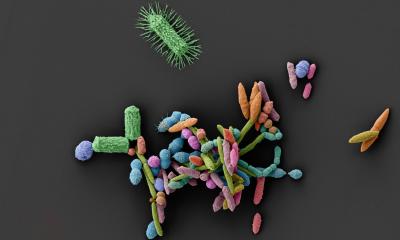Infectious diseases
Carrying home a nosocomial infection
About 6-8% of Spanish patients will develop an infection during or after a hospital stay. Can these infections be avoided? How is Spain facing up to the challenge? Dr Juan Pablo Horcajada, Head of the Department of Infectious Diseases at Hospital del Mar, Barcelona, and spokesperson of the Spanish Society of Infectious Diseases and Clinical Microbiology (SEIMC), assessed the situation and insisted on the creation of a dedicated specialty.
Report: Mélisande Rouger

As the trend for ambulatory care grows, patients may acquire an infection during their hospital stay but will actually develop a nosocomial infection when back home. For instance, chemotherapy patients, who tend not to be hospitalised any more, may develop an infection a few days after receiving treatment.
‘The number of ambulatory patients in healthcare is increasing. Therefore we prefer to use the term healthcare-associated rather than nosocomial infections, as the latter only refers to hospitalised patients,’ said Dr Juan Pablo Horcajada, Head of the Department of Infectious Diseases at Hospital del Mar, Barcelona.
Two of the most frequent healthcare associated-infections (HAIs) are urinary infections and pneumonia. Surgery patients, who are increasingly send home a few hours after the procedure, may also develop post surgery infections. Another area doctors are particularly vigilant with is bacteraemia, i.e. the presence of bacteria in the blood, which can develop after placing catheters in the circulatory system as part of treatment. Dedicated commissions regroup-ing doctors from every specialty are put in place at every hospital across Spain to monitor infection development within the structure.
The Spanish Ministry of Health is pushing for homogenisation through the National Hospital Infections Vigilance Plan, with the goal of gathering the data acquired at every site. However, in a country torn between distinct autonomous regions, systems differ hugely and collecting information on the national scale remains a challenge. Steps must be taken accordingly, Horcajada believes. ‘We need to unify our approach. Some communities have excellent initiatives to recompile infection data, but others don’t. If vigilance systems are not the same, you can’t have a global and rapid overview of what’s going on in the country; instead, you lose time trying to collect the data in every region, and sometimes their systems and codifications differ greatly,’ he said.
Infections decline
However complex their extraction, national data show a decline in the occurrence of HAIs. The proportion of patients suffering from these infections dropped from 11-12% to 6-8% in just a few years, thanks to improved vigilance and greater respect of preventive steps, such as systematic medical and patient hand washing, as well as better equipment hygiene.
However, Horcajada believes more could be done in this regard, starting with more appropriate antibiotics use. ‘This is really an open question in Spain; antibiotics tend to be used too often and too long, both in hospitals and primary assistance centres. As a result, bacteria are increasingly drug-resistant. This is one of the most serious problems in infection management nowadays and we really have to deal with it.’
The SEIMC is addressing the issue, notably by cooperating in a nationwide strategic plan to reduce the risk of selection and dissemination of antibiotics resistance. The plan is managed by the Spanish FDA and was initiated by the Spanish Ministry of Health, following a directive of the European Union. Despite all their efforts, however, healthcare providers will never be able to prevent all patients from developing HAIs, especially as people are not as healthy as they used to be. ‘HAIs will always be around; they are a normal part of healthcare,’ he observed. ‘Modern healthcare solved many problems and patients increasingly survive, but they are weaker and their immune defences are down. As a result, some infections are more common than they used to be.’
In Spain, the number of legal actions taken against doctors for HAI cases is rising, a phenomenon spreading from the USA. Instead, patients should acknowledge that every procedure carries a risk, which doctors can only try to minimise, Horcajada believes. ‘Maybe our problem is lack of communication. If patients were well informed about the risks and took greater part in their treatment, they would not think of suing their doctors. Somehow, the doctor-patient relationship was lost and we need to get it back. The moment it’s back, I don’t think we’ll have a problem anymore.’
Horcajada deplores the short time doctors can spend with patients under the current scheme, and warned against the impact of money-saving policies on healthcare quality. His wish is for the establishment of a proper infectious diseases specialty in Spain. ‘Currently infectious diseases are a subspecialisation of internal medicine, whilst they are a proper specialty in many other countries. If this were the same in Spain, HAIs management would certainly improve.’
19.06.2015











